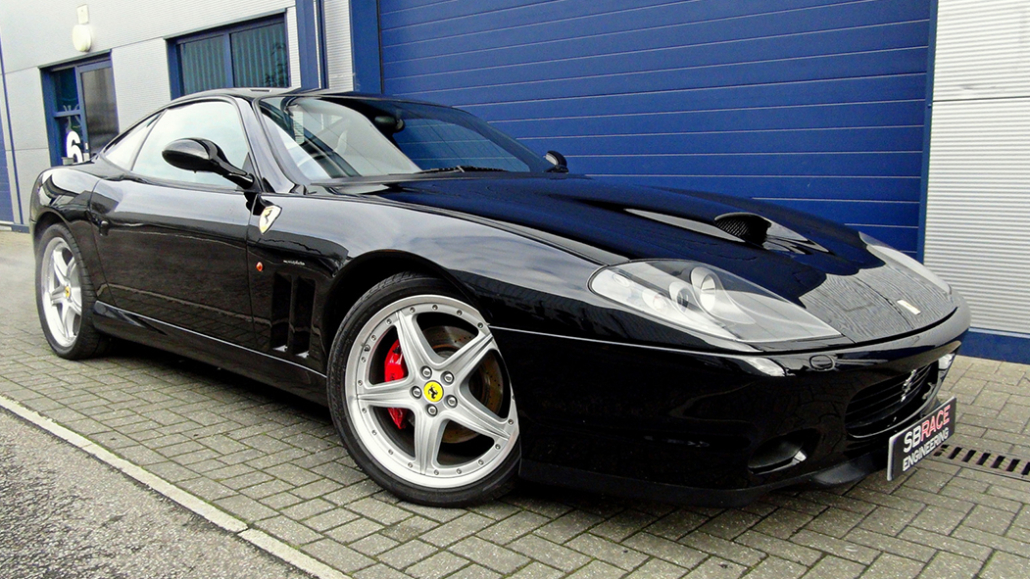
The 575M Maranello represents the very pinnacle of the Ferrari front-engined sports berlinetta concept in terms of technology and performance. In fact, the 2002 launch of the 575M Maranello signals a whole new level of achievement for one of Ferrari’s most traditional layouts – the V12 front-engined rear-wheel drive berlinetta.
The features that made the 575M Maranello unique were all referred to in its name. The 575 indicated the fact that its effective displacement had been boosted from 5500 to 5750 cc which resulted in a subsequent increase in power and torque, long the marque’s main development goals. In line with traditional Ferrari terminology, the M stood for “modified,” meaning that all round performance had been boosted. Apart from the work done on the engine, this was also the very first time that an F1-style gearbox had been used on road-going Ferrari V12 too. It was decided not to modify the beautifully sober and balanced styling of the 550 which had earned it instant classic status and which was actually perfectly in tune with Ferrari’s return to the high performance front-engined berlinetta scene. The 575M Maranello’s 12-cylinder engine retained its predecessor’s 65 degree vee angle, twin overhead cams, four valves per cylinder, light alloy engine block, heads and oil tank, and dry sump lubrication with two scavenge and one sender pump, double filter, separate tank and individual radiators.
The 575M Maranello also boasted optimal weight distribution, with a 50-50 split between the axles with the driver onboard. This came courtesy of its transaxle design which saw the rear-mounted gearbox in unit with the limited-slip differential. The 575M Maranello’s transmission sported the electro-hydraulic F1 control unit mounted at the rear of the car. This minimised response time and guaranteed optimal operating temperatures. Chassis-wise, one of the features that most influenced the car’s behaviour on the road was the new high performance adaptive damping system which independently controlled damping on all four wheels and varied ride height. The 575M Maranello was extensively revised to make it even sportier and more functional. In keeping with its boosted performance, there was also a focus on more efficient driver control. All of the instrumentation was clustered in a single pod directly in front of the driver with the rev counter at the centre.
Ferrari 575M Maranello Technical Specifications
| ENGINE | ||
| type | front, longitudinal 65° V12 | |
| bore/stroke | 89 x 77 mm | |
| unitary displacement | 479.03 cc | |
| total displacement | 5748.36 cc | |
| compression ratio | 11 : 1 | |
| maximum power | 379 kW (515 hp) at 7250 rpm | |
| power per litre | 90 hp/l | |
| maximum torque | 588 Nm (60 kgm) at 5250 rpm | |
| valve actuation | twin overhead camshafts per bank, four valves per cylinder | |
| fuel feed | Bosch Motronic injection | |
| ignition | Bosch Motronic electronic static, single spark plug per cylinder | |
| lubrication | dry sump | |
| clutch | single-plate | |
| CHASSIS | ||
| frame | tubular steel | |
| front suspension | independent, unequal-length wishbones, coil springs, telescopic shock absorbers with electronic adaptive damping, anti-roll bar | |
| rear suspension | independent, unequal-length wishbones, coil springs, telescopic shock absorbers with electronic adaptive damping, anti-roll bar | |
| brakes | discs | |
| transmission | manual or electro-hydraulic F1 6-speed + reverse | |
| steering | rack-and-pinion | |
| fuel tank | capacity 105 litres | |
| front tyres | 255/40 ZR 18 | |
| rear tyres | 295/35 ZR 18 | |
| BODYWORK | ||
| type | two-seater berlinetta | |
| length | 4550 mm | |
| width | 1935 mm | |
| height | 1277 mm | |
| wheelbase | 2500 mm | |
| front track | 1632 mm | |
| rear track | 1586 mm | |
| weight | 1730 kg (kerb) | |
| PERFORMANCE | ||
| top speed | 325 km/h | |
| acceleration 0-100 km/h | 4.25 sec 4.20 sec F1 gearbox | |
| 0-400 m | 12.30 sec 12.25 sec F1 gearbox | |
| 0-1000 m | 22.00 sec 21.90 sec F1 gearbox | |
| Consumption and emission | ||
| urban test cycle ece | 34,5 l/100 km | |
| extra urban test cycle eudc | 14,3 l/100 km | |
| consumption ece+eudc | 21,8 l/100 km | |
| co2 emissions combined | 499 g/ km | |
